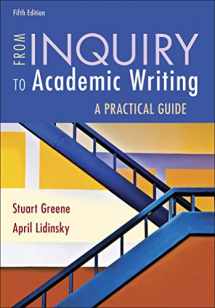
From Inquiry to Academic Writing: A Practical Guide
Book details
Summary
Description
Preface for Instructors
Brief Contents
How This Book Supports WPA Outcomes for First-Year Composition
1 Starting with Inquiry: Habits of Mind of Academic Writers
What Is Academic Writing?
What Are the Habits of Mind of Academic Writers?
Academic Writers Make Inquiries
Steps to Inquiry
A Practice Sequence: Inquiry Activities
Academic Writers Seek and Value Complexity
*Moves to Model in Academic Writing
Steps to Seeking and Valuing Complexity
A Practice Sequence: Seeking and Valuing Complexity
Academic Writers See Writing as a Conversation
*Moves to Model in Academic Conversations
Steps to Joining an Academic Conversation
A Practice Sequence: Joining an Academic Conversation
Academic Writers Understand That Writing Is a Process
Collect Information and Material
Steps to Collecting Information and Material
Draft, and Draft Again
Steps to Drafting
Revise Significantly
Steps to Revising
Academic Writers Reflect
Steps to Reflection
A Practice Sequence: Reflection Activities
Becoming Academic: Three Narratives
Ta-Nehisi Coates, from Between the World and Me
Richard Rodriguez, Scholarship Boy
*Tara Westover, from Educated
A Practice Sequence: Composing a Literacy Narrative
2 From Reading as a Writer to Writing as a Reader
Reading as an Act of Composing: Annotating
Reading as a Writer: Analyzing a Text Rhetorically
E. D. Hirsch Jr., Preface to Cultural Literacy
Identify the Situation
Identify the Writer''s Purpose
Identify the Writer''s Claims
*Moves to Model for Making a Claim
*Identify the Writer''s Appeals: Ethos, Pathos, and Logos
Identify the Writer''s Audience
Steps to Analyzing a Text Rhetorically
A Practice Sequence: Analyzing a Text Rhetorically
*Nick Hanauer, Education Isn''t Enough
Writing as a Reader: Composing a Rhetorical Analysis
David Tyack, Whither History Textbooks?
An Annotated Student Rhetorical Analysis
Quentin Collie, A Rhetorical Analysis of "Whither History Textbooks?" (Student Writing)
Writing a Rhetorical Analysis
Sherry Turkle, The Flight from Conversation
A Practice Sequence: Writing a Rhetorical Analysis
3 From Writing Summaries and Paraphrases to Writing Yourself into Academic Conversations
Summaries, Paraphrases, and Quotations
Writing a Paraphrase
Steps to Writing a Paraphrase
A Practice Sequence: Writing a Paraphrase
Writing a Summary
Clive Thompson, On the New Literacy
Describe the Key Claims of the Text
Select Examples to Illustrate the Author''s Argument
Present the Gist of the Author''s Argument
Contextualize What You Summarize
Steps to Writing a Summary
*Moves to Model for Summarizing
A Practice Sequence: Writing a Summary
Writing Yourself into Academic Conversations
Steps to Writing Yourself into an Academic Conversation
A Practice Sequence: Writing Yourself into an Academic Conversation
Tom Standage, History Retweets Itself
4 From Identifying Claims to Analyzing Arguments
Identifying Types of Claims
Dana Radcliffe, Dashed Hopes: Why Aren''t Social Media Delivering Democracy?
Identify Claims of Fact
Identify Claims of Value
Identify Claims of Policy
Steps to Identifying Claims
A Practice Sequence: Identifying Claims
Analyzing Arguments
Analyze the Reasons Used to Support a Claim
Identify Concessions
Identify Counterarguments
*Moves to Model for Analyzing Arguments
An Annotated Student Argument
Marques Camp, The End of The World May Be Nigh, and It''s the Kindle''s Fault (Student Writing)
Steps to Analyzing an Argument
A Practice Sequence: Analyzing an Argument
Susan D. Blum, The United States of (Non)Reading: The End of Civilization or a New Era?
Recognizing Logical Fallacies
Analyzing and Comparing Arguments
Stuart Rojstaczer, Grade Inflation Gone Wild
Phil Primack, Doesn''t Anybody Get a C Anymore?
A Practice Sequence: Analyzing and Comparing Arguments
5 From Identifying Issues to Forming Questions
Identifying Issues
Draw on Your Personal Experience
Identify What Is Open to Dispute
Resist Binary Thinking
Build on and Extend the Ideas of Others
Read to Discover a Writer''s Frame
Consider the Constraints of the Situation
Steps to Identifying Issues
Identifying Issues in an Essay
Anna Quindlen, Doing Nothing Is Something
A Practice Sequence: Identifying Issues
Formulating Issue-Based Questions
Refine Your Topic
Explain Your Interest in the Topic
Identify an Issue
*Moves to Model for Identifying an Issue
Formulate Your Topic as a Question
Acknowledge Your Audience
Steps to Formulating an Issue-Based Question
A Practice Sequence: Formulating an Issue-Based Question


We would LOVE it if you could help us and other readers by reviewing the book
Book review



